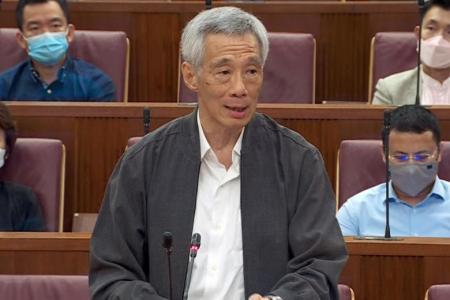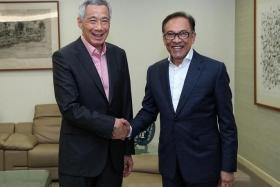Singapore not immune to decline if it lets political standards slide: PM Lee
While most countries are founded on the basis of high ideals and noble values, the tone of the society changes as later generations take over and things gradually go downhill, Prime Minister Lee Hsien Loong said on Tuesday (Feb 15).
Marshalling four contemporary examples, he warned that Singapore is not immune from going down a similar road.
Leaders who fought for and won independence are often exceptional individuals who came through the crucible of fire as leaders of men and nations, said PM Lee, such as David Ben-Gurion of Israel and Jawaharlal Nehru of India.
"Imbued with enormous personal prestige, they strive to meet the high expectations of their peoples to build a brave new world, and shape a new future for their peoples and for their countries," he said, noting that their countries began as healthy democracies with idealism and zeal.
Succeeding generations, however, find it hard to sustain this momentum past the initial fervour.
"All too easily - a slip here, a blind eye there, a fudge, a trim - and gradually things go downhill. The texture of politics changes, respect for politicians declines," noted Mr Lee.
After a while, the electorate comes to regard this as the norm, and that one cannot expect better, and so standards get debased, trust is eroded, and the country declines further, he added.
The result is that many political systems today would be quite unrecognisable to their founding leaders, he said.
Israel, for instance, has morphed into a country that can barely form a government despite four general elections in two years, while a stream of its senior politicians and officials face "a litany of criminal charges", said Mr Lee.
In India, almost half the MPs in the Lok Sabha (Lower House) have criminal charges pending against them, including for rape and murder according to media reports, he noted, though it is said that many of the allegations are politically motivated.
In the United States, trust in the political system has all but broken down, with three-quarters of Republicans believing that the last presidential election was stolen and that Mr Joe Biden is not a legitimate president, Mr Lee added.
Britain, also called "the mother of Parliaments" for its Westminster system, is dealing with a severe breakdown of trust and lost credibility due to the "Partygate" scandal where it ignored its own Covid-19 rules, Mr Lee said.
Quoting former British Prime Minister John Major, who recently spoke about the lamentable state of British politics today, Mr Lee said that while there has been cynicism about politics since the dawn of time, politicians are not all the same and lies are not acceptable.
To imply otherwise is to cheapen public life and slander the vast majority of elected politicians who do not knowingly mislead people, he added.
But those who do tarnish both politics and the reputation of Parliament, and this is a dangerous trend, he said.
"If lies become commonplace, truth ceases to exist. What and who, then, can we believe? The risk is...nothing and no-one. And where are we then?" asked Sir Major.
Mr Lee noted that while this is a Western view, Eastern philosophy in fact prizes norms and values even more highly, as it says that the right to govern flows from one's virtues and moral standing.
He cited the four social guidelines that hold a state together under Confucian thought: rituals, righteousness, probity and shame as a reaction to wrongdoing.
"What I personally find most disappointing in the WP narrative and in their response, including in this House today, is the complete absence of any admission that the three MPs have done anything wrong. There is no contrition," he said.
"Whether you take a Western or Eastern view, if lack of shame becomes the public norm, our political system will break down, progressively and irreversibly."
The result is public mistrust not only in individual leaders or political parties, but the whole political system, as has happened too often elsewhere, said Mr Lee.
Mr Lee cautioned that modern Singapore does not come born with a fail-safe mechanism, even as the founding fathers did their best to build strong institutions.
When the Barisan Sosialis vacated its seats in Parliament in 1966, which left the People's Action Party completely dominant as a result, founding Prime Minister Lee Kuan Yew deliberately chose not to change the Constitution and turn Singapore into a one-party state, he noted.
"He knew that without the need to contest and win elections, the governing party would over time become complacent and flabby, and that would be disastrous for Singapore," said Mr Lee.
Instead, the founding leaders chose the more robust path of keeping politics contestable and building up institutions such as Parliament, the judiciary and the civil service so that Singapore would be more resilient, "not dependent on a few key people pulling all the levers, pushing all the buttons, making everything work".
It is therefore incumbent on each succeeding generation to protect and build upon this system, to uphold integrity and ensure the same rules apply equally to everyone, said Mr Lee.
"If we can do that - consistently, persistently, unflinchingly - then we have a shot at making things work. People can trust our leaders, our systems, and our institutions. Our democracy can mature, deepen and grow more resilient, as both the governed and the governing embrace and express the right norms and values," he said.
"But if we allow ourselves to slacken - loosen standards here, just a bit; overlook a lie there, just this time - the virtuous cycle will stutter and start to fail."
Get The New Paper on your phone with the free TNP app. Download from the Apple App Store or Google Play Store now


